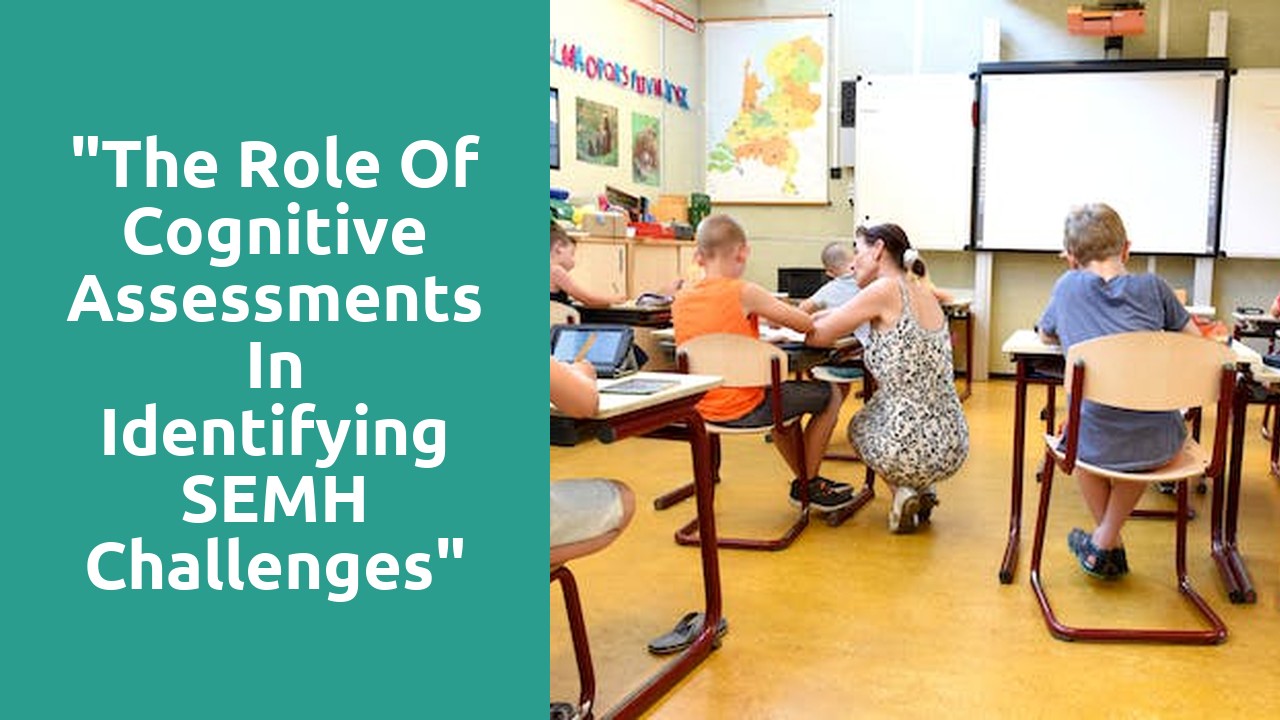

In today's society, there is an urgent need to unmask the hidden struggles that many individuals face in regards to their social, emotional, and mental health challenges. Often, these struggles go unnoticed, leading to a lack of appropriate support and intervention. However, cognitive assessments have emerged as a powerful tool to shed light on these hidden struggles, illuminating the path towards understanding and addressing SEMH challenges.
Cognitive assessments provide a comprehensive evaluation of an individual's cognitive abilities, which encompass skills such as memory, attention, problem-solving, and executive functioning. By assessing these cognitive domains, professionals can identify specific areas of strength and weakness that may be impacting an individual's social, emotional, and mental well-being. This valuable insight allows for a more accurate understanding of the underlying causes of SEMH challenges, enabling tailored interventions and support to be put in place.
Assessing cognitive abilities is a powerful tool in uncovering Social, Emotional, and Mental Health (SEMH) issues in individuals. By evaluating cognitive skills such as memory, attention, and problem-solving abilities, professionals can gain valuable insights into the underlying challenges that may contribute to SEMH difficulties.
Cognitive assessments provide a comprehensive understanding of an individual's cognitive strengths and weaknesses, enabling professionals to pinpoint specific areas of difficulty. This knowledge is crucial in identifying the root causes of SEMH issues, as cognitive deficits can often be intertwined with mental health struggles. By comprehensively examining cognitive abilities, professionals can uncover potential barriers to effective social interaction, emotional regulation, and overall mental well-being. Without such assessments, these hidden struggles may go unnoticed, leading to further distress and complications.
Understanding the Connection: Cognitive Assessments and SEMH Challenges
Cognitive assessments play a vital role in unraveling the complex web of social, emotional, and mental health (SEMH) challenges that individuals may face. By examining an individual's cognitive abilities, we gain valuable insights into their thinking processes, which can greatly aid in identifying underlying SEMH issues.
The connection between cognitive assessments and SEMH challenges lies in the fact that cognition and mental health are intimately intertwined. Our thoughts, beliefs, and emotions are all influenced by our cognitive abilities, such as attention, memory, and problem-solving skills. When individuals experience difficulties in these areas, it can have a profound impact on their overall emotional well-being and social functioning. Therefore, by assessing an individual's cognitive strengths and weaknesses, we can identify areas of struggle that may be contributing to their SEMH challenges. This knowledge then becomes a powerful tool in developing targeted interventions and support strategies to address these underlying issues and promote positive mental health.
Cognitive assessments play a crucial role in shedding light on mental health challenges. By evaluating an individual's cognitive abilities, these assessments provide valuable insights into underlying issues that may be impacting their overall well-being. These assessments go beyond simple measures of intelligence and delve into areas such as memory, attention, problem-solving, and executive functioning. This holistic approach allows professionals to gain a comprehensive understanding of an individual's cognitive strengths and weaknesses, providing a foundation for effective diagnosis and intervention.
One of the key benefits of cognitive assessments is their ability to identify hidden struggles that may not be immediately apparent. Many individuals with mental health challenges, particularly those with social, emotional, and mental health (SEMH) issues, often mask their difficulties, making it challenging for educators, counselors, and caregivers to spot their needs. However, cognitive assessments provide a window into their cognitive functioning, unveiling the presence of underlying challenges that may otherwise go unnoticed. This knowledge empowers professionals to provide targeted interventions and support, helping individuals navigate their struggles and reach their full potential.
Decoding the Mind: How Cognitive Assessments Help Identify SEMH Challenges
Cognitive assessments play a crucial role in identifying social, emotional, mental health (SEMH) challenges in individuals. By examining cognitive functions such as attention, memory, reasoning, and problem-solving skills, these assessments provide valuable insights into the underlying cognitive processes that may contribute to SEMH issues. Through a comprehensive evaluation of cognitive abilities, professionals are able to identify potential areas of difficulty and better guide individuals towards appropriate interventions and support.
One of the key benefits of cognitive assessments in identifying SEMH challenges lies in their objective nature. Unlike self-reported measures or subjective observations, which can be influenced by various factors, cognitive assessments provide a standardized and reliable way to measure an individual's cognitive functioning. This allows professionals to obtain a clearer understanding of an individual's strengths and weaknesses, leading to more targeted interventions and support strategies. With the help of cognitive assessments, professionals can effectively uncover specific cognitive deficits or patterns of cognitive functioning that may be contributing to SEMH challenges, enabling them to develop customized interventions that address these underlying issues.
Unlocking the potential of individuals with social, emotional, and mental health (SEMH) challenges is crucial for their overall well-being and success. One powerful tool in achieving this is the use of cognitive assessments. Cognitive assessments provide valuable insight into an individual's cognitive abilities, such as memory, attention, problem-solving, and decision-making skills. By evaluating these cognitive abilities, professionals can gain a deeper understanding of the challenges that individuals with SEMH may face and design targeted interventions to support their growth and development.
Cognitive assessments play a vital role in uncovering SEMH issues by shedding light on the specific cognitive processes that may be impacting an individual's emotional well-being. For example, a student struggling with SEMH challenges might have difficulty with impulse control or the ability to regulate emotions. Through a cognitive assessment, professionals can identify underlying cognitive deficits that may be contributing to these challenges. Armed with this knowledge, they can tailor interventions that directly address these specific cognitive weaknesses, empowering individuals to better manage their emotions and behaviors. Moreover, cognitive assessments can provide benchmarks for progress, allowing professionals to track an individual's growth over time and make informed decisions about appropriate support and intervention strategies.